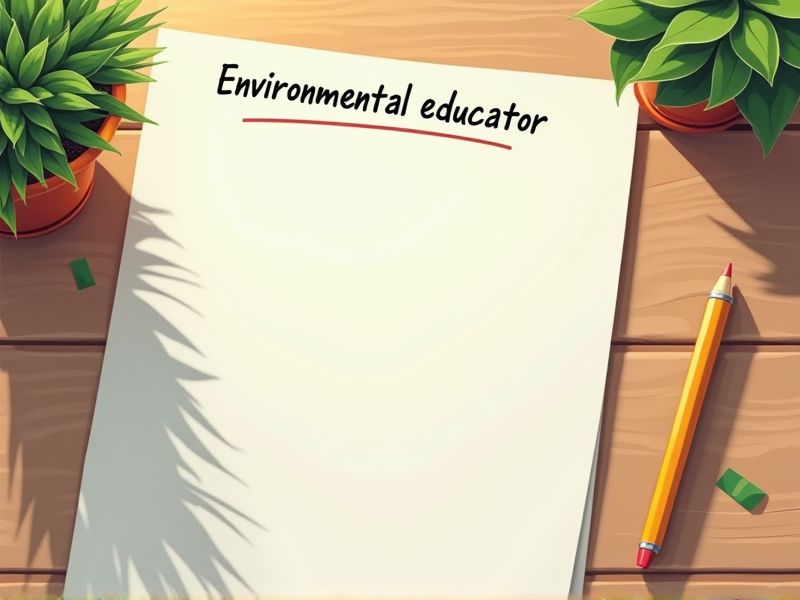
Environmental educators bridge the gap between complex environmental issues and the public's understanding. Certifications are essential because they ensure educators have a thorough grasp of both scientific data and effective teaching methodologies. These credentials not only enhance credibility but also instill trust in audiences that are increasingly seeking reliable information. Key certifications can significantly bolster your journey as an environmental educator.
Certified Environmental Educator (CEE)
A Certified Environmental Educator (CEE) ensures teaching practices align with current scientific research and environmental standards. Such certification enables educators to develop comprehensive curricula that effectively engage students in sustainability concepts. The CEE credential promotes credibility and trust, fostering stronger community and institutional partnerships. It equips educators with the necessary tools and skills to address diverse environmental challenges and inspire informed action.
Certified Interpretive Guide (CIG)
Certified Interpretive Guides enhance communication effectiveness by using proven techniques to connect people to environmental topics meaningfully. Possessing this certification ensures an educator can engage diverse audiences, increasing the retention of educational content. Interpretive skills play a critical role in fostering emotional and intellectual connections, which can inspire proactive environmental behavior. This certification often leads to greater credibility, opening opportunities for collaboration and funding in environmental education projects.
National Environmental Education Certificate (NEEC)
Environmental educators require the National Environmental Education Certificate (NEEC) to verify their knowledge and skills in delivering accurate and effective environmental education. Certification ensures educators are up-to-date with current environmental issues and teaching methods, enhancing the quality of education provided to students. This credential builds public trust and institutional credibility, encouraging more schools and organizations to adopt comprehensive environmental programs. NEEC also fosters a network of informed educators, promoting collaboration and sharing of innovative educational strategies and resources.
Certified Wildlife Educator (CWE)
Certified Wildlife Educators bring expertise that enhances the credibility and effectiveness of environmental education programs. Their certification ensures they have the necessary knowledge to communicate complex ecological concepts accurately and engage the audience meaningfully. With a CWE, educators are better equipped to influence public attitudes and behaviors towards conservation efforts. This certification also standardizes educational practices, allowing for consistent, high-quality learning experiences across various institutions.
LEED Green Associate Certification
LEED Green Associate Certification provides an environmental educator with foundational knowledge of sustainable building principles, enhancing their ability to teach effectively. It equips them with an understanding of eco-friendly practices, aligning educational content with real-world green initiatives. With certification, educators gain credibility, inspiring confidence in students and stakeholders about their expertise. This credential supports integrating sustainability topics into curricula, fostering awareness and action toward environmental conservation.
Environmental Management Systems (EMS) Certification (ISO 14001)
Environmental educators need EMS Certification (ISO 14001) to demonstrate credibility and commitment to sustainable practices in their teaching methodologies. The certification helps educators effectively manage and minimize the environmental impact of their educational activities, aligning their practices with global sustainability standards. With EMS, educators can employ a structured framework to systematically address environmental issues, thus enhancing their curriculum with real-world examples. It also aids in fostering trust and accountability among students and stakeholders, promoting broader acceptance of environmental education initiatives.
Climate Change Educator Certificate
Climate change educator certificates equip environmental educators with a structured understanding of the science and impacts of climate change, ensuring they convey accurate information to learners. Standardized certification fosters credibility and enhances public trust in educational programs focused on environmental issues. Such credentials ensure educators are proficient in effective communication strategies, necessary for engaging diverse audiences and inspiring actionable change. Certificates often provide access to resources and networks, enabling educators to stay updated on the latest research and pedagogical approaches.
Wilderness First Responder Certification
Wilderness First Responder Certification equips environmental educators with vital skills to handle emergencies in remote settings, enhancing safety during field excursions. Environmental educators often lead groups in nature, where immediate medical assistance might be delayed, necessitating preparedness to manage injuries or illnesses. Holding this certification increases credibility and trust among participants and stakeholders, reinforcing the educator's expertise and commitment to safety. Acquiring these skills also promotes a deeper understanding of environmental hazards, enabling effective risk management and teaching strategies in the field.
Sustainable Tourism Professional Certification
Increased demand for sustainable tourism practices requires environmental educators to possess up-to-date, verified knowledge, which sustainable tourism professional certification provides. Certification equips educators with tools and methodologies that drive responsible tourism, directly impacting environmental preservation. Stakeholders are more likely to engage educators who demonstrate a formal commitment to sustainability, leading to increased opportunities and visibility. Certification aligns educational practices with global sustainability goals, creating a unified approach to tackling climate change and biodiversity loss.
Project Management Professional (PMP) Certification
The PMP certification equips environmental educators with structured project management skills, enhancing their ability to effectively plan and execute environmental programs. This expertise increases the likelihood of achieving environmental goals on time and within budget, which is crucial for gaining support and funding. The certification also demonstrates a commitment to professional development, raising the educator's credibility among stakeholders. Employers often prioritize certified professionals, increasing job opportunities and career advancement in the environmental education field.
Summary
When you obtain certifications in environmental education, it enhances your credibility and expertise in the field. This validation can lead to increased professional opportunities, such as leadership roles or specialized projects. The certification may also improve your teaching methods and enable more effective communication of complex environmental topics. Consequently, students and community members benefit from a higher quality of education and advocacy efforts.
